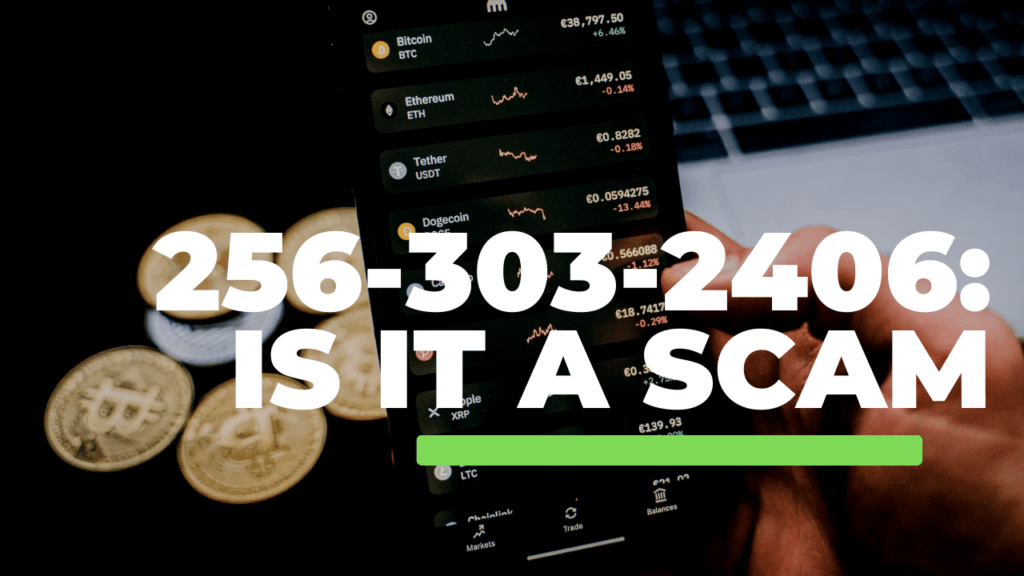With the rise of scam calls, many individuals are growing more cautious about unknown numbers, and one number that has raised concern is 256-303-2406. While not every unknown number is part of a scam, it’s always better to be vigilant and proactive when answering such calls. In this article, we’ll explore the characteristics of scam calls, signs that a number like 256-303-2406 may be suspicious, and how to protect yourself from potential phone scams.
What Is 256-303-2406?
At first glance, 256-303-2406 may look like an ordinary phone number. It doesn’t immediately appear suspicious. However, just because a phone number looks like a regular, local one doesn’t mean it’s safe to answer. Scammers increasingly use familiar or local numbers to trick people into picking up the phone. These scammers rely on your curiosity or the appearance of legitimacy to engage you.
Scammers can use different techniques to hide their true identity, often employing tools like number spoofing. This method involves altering the phone number on your caller ID to make it seem like the call is coming from a local number. Many people feel more comfortable answering a local call, which increases the likelihood of falling into the scammer’s trap.
Why You Should Be Cautious of Unknown Numbers
It’s natural to want to answer the phone, especially if it’s from a number you don’t recognise. However, the risk of scam calls has grown significantly in recent years. Scammers prey on people’s instincts by making the call seem urgent, important, or friendly. If you pick up a call from a number like 256-303-2406 and the person on the other end is unfamiliar, it’s a good idea to proceed cautiously.
Scammers aim to access your personal information or trick you into handing over money. They might claim to be from a trusted organisation, such as a bank, government agency, or even a well-known business. The more familiar they seem, the more likely you are to trust them. But this is where caution is crucial. Scammers often use pressure tactics, such as telling you your account is compromised or your identity is at risk, to rush you into making decisions without thinking it through.
How to Identify a Scam Call
Identifying a scam call is critical to avoiding falling victim to one. Scammers are getting increasingly sophisticated, but there are still common warning signs that can help you recognise a potential scam. Here are a few tips to keep in mind when determining whether a call is legitimate:
- Unsolicited calls: If you received a call from 256-303-2406 and weren’t expecting it, that’s a red flag. Legitimate businesses and government agencies won’t call you out of the blue without prior contact.
- Urgency and pressure: Scammers often create a sense of urgency to make you act quickly. They may tell you that your bank account has been hacked or that you owe money and will face legal action if you don’t pay immediately.
- Requests for personal information: Legitimate companies and government agencies will never ask over the phone for sensitive personal information, like your Social Security number or banking details.
- Suspicious payment methods: Scammers frequently ask for payment via unusual methods, like gift cards, wire transfers, or cryptocurrencies. This is a significant red flag, as legitimate businesses won’t ask for these types of payments.
- Too good-to-be-true offers: If a caller promises something that seems too good, such as a free vacation or a large sum of money, it’s likely a scam.
What to Do If You Suspect a Scam Call
If you receive a call from 256-303-2406 or any other number that raises suspicion, the best action is to remain calm and avoid giving out personal information. If you’re unsure whether the call is legitimate, you can follow these steps:
- Don’t engage: If something feels off about the call, don’t engage with the caller. You can hang up immediately and avoid providing information or answering questions.
- Verify the caller’s identity: If the caller claims to be from a company or government agency, you can verify their identity by contacting the organisation directly. Use official contact information, not the phone number provided by the caller, to ensure you’re speaking with a legitimate representative.
- Report the number: You can report suspicious phone numbers, like 256-303-2406, to your phone carrier, the Federal Trade Commission (FTC), or other relevant authorities. This helps alert others to potential scams and may assist in preventing future scam calls.
- Block the number: If you’ve determined that the call is a scam, you can block the number to avoid future calls from that source.
What to Watch Out for with Scam Calls
Scam calls are not just limited to one tactic. Scammers continuously evolve their techniques, so staying informed about common scams is essential. Here are a few examples of scams that may come from numbers like 256-303-2406:
- IRS or tax-related scams: Scammers often impersonate IRS agents, claiming that you owe back taxes and will face legal consequences if you don’t pay immediately. The IRS will never call you out of the blue. Instead, they send official notices through the mail.
- Bank or credit card scams: The caller claims a problem with your bank account or credit card. They may ask you to verify your account information to “fix” the issue, which can lead to identity theft.
- Prize or lottery scams: Scammers may tell you you’ve won a prize or lottery you never entered. To claim your winnings, they’ll ask for your personal information or a payment upfront, a telltale sign of fraud.
- Charity scams: Some scammers exploit your generosity by pretending to represent a charity, especially after natural disasters or tragedies. Always verify that a charity is legitimate before donating.
- Tech support scams: The scammer pretends to be from a tech company, such as Microsoft or Apple, claiming your computer is infected with a virus. They’ll offer to fix the problem remotely, often leading to them gaining access to your files or installing malicious software.
Protecting Yourself from Phone Scams
In a world where scam calls are becoming more frequent, taking steps to protect yourself is essential. Simple practices can significantly reduce the likelihood of falling victim to a phone scam.
- Don’t answer unknown numbers: If you don’t recognise the number, it’s often best to let the call go to voicemail. If it’s important, the caller will leave a message, and you can return the call once you verify their identity.
- Enable call blocking: Many smartphones and phone carriers offer call-blocking features that can help reduce unwanted calls. Some apps are designed to identify and block scam calls automatically.
- Register with the Do Not Call List: In the U.S., you can register your phone number with the National Do Not Call Registry. While this won’t stop all scam calls, it can reduce the number of legitimate telemarketing calls you receive, making it easier to spot potential scams.
- Stay informed: Scammers constantly change tactics, so staying informed about the latest scams is crucial. Keep an eye on news reports and consumer protection websites to learn about new schemes and how to avoid them.
Conclusion
Scammers are constantly looking for ways to trick unsuspecting individuals, and phone numbers like 256-303-2406 may be part of their scheme. While avoiding scam calls is impossible, staying informed and cautious can help protect you from falling victim. By recognising the warning signs, verifying unknown callers, and safeguarding your personal information, you can minimise the risk of being targeted by phone scams. Always remember, if something feels off about a call, it’s better to be safe than sorry.



